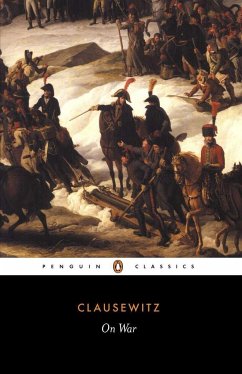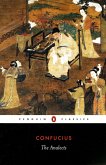20,99 €
inkl. MwSt.
Versandfertig in 2-4 Wochen

10 °P sammeln
- Broschiertes Buch
- Merkliste
- Auf die Merkliste
- Bewerten Bewerten
- Teilen
- Produkt teilen
- Produkterinnerung
- Produkterinnerung
In line with Napoleon's own military actions, he illustrated the need to annihilate the enemy and make a strong display of one's power in an 'absolute war' without compromise. But he was also careful to distinguish between war and politics, arguing that war could only be justified when debate was no longer adequate.
Andere Kunden interessierten sich auch für
![The Prince The Prince]() Niccolo MachiavelliThe Prince14,99 €
Niccolo MachiavelliThe Prince14,99 €![The State and Revolution The State and Revolution]() Vladimir LeninThe State and Revolution19,99 €
Vladimir LeninThe State and Revolution19,99 €![The Analects The Analects]() ConfuciusThe Analects17,99 €
ConfuciusThe Analects17,99 €![The Condition of the Working Class in England The Condition of the Working Class in England]() Friedrich EngelsThe Condition of the Working Class in England20,99 €
Friedrich EngelsThe Condition of the Working Class in England20,99 €![The Condition of the Working Class in England The Condition of the Working Class in England]() Friedrich EngelsThe Condition of the Working Class in England19,99 €
Friedrich EngelsThe Condition of the Working Class in England19,99 €![Utilitarianism and Other Essays Utilitarianism and Other Essays]() Jeremy BenthamUtilitarianism and Other Essays18,99 €
Jeremy BenthamUtilitarianism and Other Essays18,99 €![Physics and Philosophy Physics and Philosophy]() Werner HeisenbergPhysics and Philosophy18,99 €
Werner HeisenbergPhysics and Philosophy18,99 €-
-
-
In line with Napoleon's own military actions, he illustrated the need to annihilate the enemy and make a strong display of one's power in an 'absolute war' without compromise. But he was also careful to distinguish between war and politics, arguing that war could only be justified when debate was no longer adequate.
Hinweis: Dieser Artikel kann nur an eine deutsche Lieferadresse ausgeliefert werden.
Hinweis: Dieser Artikel kann nur an eine deutsche Lieferadresse ausgeliefert werden.
Produktdetails
- Produktdetails
- Penguin Classics
- Verlag: Penguin Books UK
- Artikelnr. des Verlages: 42393
- 1982.
- Seitenzahl: 464
- Erscheinungstermin: 29. Juli 1982
- Englisch
- Abmessung: 199mm x 128mm x 21mm
- Gewicht: 328g
- ISBN-13: 9780140444278
- ISBN-10: 0140444270
- Artikelnr.: 11932307
- Herstellerkennzeichnung
- Libri GmbH
- Europaallee 1
- 36244 Bad Hersfeld
- gpsr@libri.de
- Penguin Classics
- Verlag: Penguin Books UK
- Artikelnr. des Verlages: 42393
- 1982.
- Seitenzahl: 464
- Erscheinungstermin: 29. Juli 1982
- Englisch
- Abmessung: 199mm x 128mm x 21mm
- Gewicht: 328g
- ISBN-13: 9780140444278
- ISBN-10: 0140444270
- Artikelnr.: 11932307
- Herstellerkennzeichnung
- Libri GmbH
- Europaallee 1
- 36244 Bad Hersfeld
- gpsr@libri.de
Prussian general and military theorist Charles Von Clausewitz was born in the Prussian city of Burg in 1780. He was commissioned to take part in the campaigns of the First Coalition against Revolutionary France. He is most famous for his military treatise Vom Kriege, translated into English as On War.
On WarPreface to the Pelican Edition
Introduction by Anatol Rapoport
On War
Introduction by Col. F. N. Maude
Introduction of the Author
Brief Memoir of General Clausewitz by the Translator
Book One: On The Nature Of War
I. What is War?
II. End and Means in War
III. The Genius for War
IV. Of Danger in War
V. Of Bodily Exertion in War
VI. Information in War
VII. Friction in War
VIII. Concluding Remarks
Book Two: On The Theory Of War
I. Branches of the Art of War
II. On the Theory of War
III. Art or Science of War
IV. Methodicism
V. Criticism
VI. On Examples
Book Three: Of Strategy In General
I. Strategy
II. Elements of Strategy
III. Moral Forces
IV. The Chief Moral Powers
V. Military Virtue of an Army
VI. Boldness
VII. Perseverance
VIII. Superiority of Numbers
IX. The Surprise
X. Stratagem
XI. Assembly of Forces in Space
XII. Assembly of Forces in Time
XIII. Strategic Reserve
XIV. Economy of Forces
XV. Geometrical Element
XVI. On the Suspension of the Act in War
XVII. On the Character of Modern War
XVIII. Tension and Rest
Book Four: The Combat
I. Introductory
II. Character of the Modern Battle
III. The Combat in General
IV. The Combat in General (continuation)
V. On the Signification of the Combat
VI. Duration of the Combat
VII. Decision of the Combat
VIII. Mutual Understanding as to a Battle
IX. The Battle
X. Effects of Victory
XI. The Use of the Battle
XII. Strategic Means of Utilizing Victory
XIII. Retreat After a Lost Battle
Sketches For Book Eight: Plan Of War
I. Introduction
II. Absolute and Real War
III. (A) Interdependence of the Parts in War
(B) Of the Magnitude of the Object of the War, and the Efforts to be Made
IV. Ends in War More Precisely DefinedOverthrow of the Enemy
V. Ends in War More Precisely Defined (continued)Limited Object
VI. (A) Influence of the Political Object on the Military Object
(B) War as an Instrument of Policy
Concluding Remarks by Anatol Rapoport
Notes
References
Glossary
Index
Introduction by Anatol Rapoport
On War
Introduction by Col. F. N. Maude
Introduction of the Author
Brief Memoir of General Clausewitz by the Translator
Book One: On The Nature Of War
I. What is War?
II. End and Means in War
III. The Genius for War
IV. Of Danger in War
V. Of Bodily Exertion in War
VI. Information in War
VII. Friction in War
VIII. Concluding Remarks
Book Two: On The Theory Of War
I. Branches of the Art of War
II. On the Theory of War
III. Art or Science of War
IV. Methodicism
V. Criticism
VI. On Examples
Book Three: Of Strategy In General
I. Strategy
II. Elements of Strategy
III. Moral Forces
IV. The Chief Moral Powers
V. Military Virtue of an Army
VI. Boldness
VII. Perseverance
VIII. Superiority of Numbers
IX. The Surprise
X. Stratagem
XI. Assembly of Forces in Space
XII. Assembly of Forces in Time
XIII. Strategic Reserve
XIV. Economy of Forces
XV. Geometrical Element
XVI. On the Suspension of the Act in War
XVII. On the Character of Modern War
XVIII. Tension and Rest
Book Four: The Combat
I. Introductory
II. Character of the Modern Battle
III. The Combat in General
IV. The Combat in General (continuation)
V. On the Signification of the Combat
VI. Duration of the Combat
VII. Decision of the Combat
VIII. Mutual Understanding as to a Battle
IX. The Battle
X. Effects of Victory
XI. The Use of the Battle
XII. Strategic Means of Utilizing Victory
XIII. Retreat After a Lost Battle
Sketches For Book Eight: Plan Of War
I. Introduction
II. Absolute and Real War
III. (A) Interdependence of the Parts in War
(B) Of the Magnitude of the Object of the War, and the Efforts to be Made
IV. Ends in War More Precisely DefinedOverthrow of the Enemy
V. Ends in War More Precisely Defined (continued)Limited Object
VI. (A) Influence of the Political Object on the Military Object
(B) War as an Instrument of Policy
Concluding Remarks by Anatol Rapoport
Notes
References
Glossary
Index
On WarPreface to the Pelican Edition
Introduction by Anatol Rapoport
On War
Introduction by Col. F. N. Maude
Introduction of the Author
Brief Memoir of General Clausewitz by the Translator
Book One: On The Nature Of War
I. What is War?
II. End and Means in War
III. The Genius for War
IV. Of Danger in War
V. Of Bodily Exertion in War
VI. Information in War
VII. Friction in War
VIII. Concluding Remarks
Book Two: On The Theory Of War
I. Branches of the Art of War
II. On the Theory of War
III. Art or Science of War
IV. Methodicism
V. Criticism
VI. On Examples
Book Three: Of Strategy In General
I. Strategy
II. Elements of Strategy
III. Moral Forces
IV. The Chief Moral Powers
V. Military Virtue of an Army
VI. Boldness
VII. Perseverance
VIII. Superiority of Numbers
IX. The Surprise
X. Stratagem
XI. Assembly of Forces in Space
XII. Assembly of Forces in Time
XIII. Strategic Reserve
XIV. Economy of Forces
XV. Geometrical Element
XVI. On the Suspension of the Act in War
XVII. On the Character of Modern War
XVIII. Tension and Rest
Book Four: The Combat
I. Introductory
II. Character of the Modern Battle
III. The Combat in General
IV. The Combat in General (continuation)
V. On the Signification of the Combat
VI. Duration of the Combat
VII. Decision of the Combat
VIII. Mutual Understanding as to a Battle
IX. The Battle
X. Effects of Victory
XI. The Use of the Battle
XII. Strategic Means of Utilizing Victory
XIII. Retreat After a Lost Battle
Sketches For Book Eight: Plan Of War
I. Introduction
II. Absolute and Real War
III. (A) Interdependence of the Parts in War
(B) Of the Magnitude of the Object of the War, and the Efforts to be Made
IV. Ends in War More Precisely DefinedOverthrow of the Enemy
V. Ends in War More Precisely Defined (continued)Limited Object
VI. (A) Influence of the Political Object on the Military Object
(B) War as an Instrument of Policy
Concluding Remarks by Anatol Rapoport
Notes
References
Glossary
Index
Introduction by Anatol Rapoport
On War
Introduction by Col. F. N. Maude
Introduction of the Author
Brief Memoir of General Clausewitz by the Translator
Book One: On The Nature Of War
I. What is War?
II. End and Means in War
III. The Genius for War
IV. Of Danger in War
V. Of Bodily Exertion in War
VI. Information in War
VII. Friction in War
VIII. Concluding Remarks
Book Two: On The Theory Of War
I. Branches of the Art of War
II. On the Theory of War
III. Art or Science of War
IV. Methodicism
V. Criticism
VI. On Examples
Book Three: Of Strategy In General
I. Strategy
II. Elements of Strategy
III. Moral Forces
IV. The Chief Moral Powers
V. Military Virtue of an Army
VI. Boldness
VII. Perseverance
VIII. Superiority of Numbers
IX. The Surprise
X. Stratagem
XI. Assembly of Forces in Space
XII. Assembly of Forces in Time
XIII. Strategic Reserve
XIV. Economy of Forces
XV. Geometrical Element
XVI. On the Suspension of the Act in War
XVII. On the Character of Modern War
XVIII. Tension and Rest
Book Four: The Combat
I. Introductory
II. Character of the Modern Battle
III. The Combat in General
IV. The Combat in General (continuation)
V. On the Signification of the Combat
VI. Duration of the Combat
VII. Decision of the Combat
VIII. Mutual Understanding as to a Battle
IX. The Battle
X. Effects of Victory
XI. The Use of the Battle
XII. Strategic Means of Utilizing Victory
XIII. Retreat After a Lost Battle
Sketches For Book Eight: Plan Of War
I. Introduction
II. Absolute and Real War
III. (A) Interdependence of the Parts in War
(B) Of the Magnitude of the Object of the War, and the Efforts to be Made
IV. Ends in War More Precisely DefinedOverthrow of the Enemy
V. Ends in War More Precisely Defined (continued)Limited Object
VI. (A) Influence of the Political Object on the Military Object
(B) War as an Instrument of Policy
Concluding Remarks by Anatol Rapoport
Notes
References
Glossary
Index







